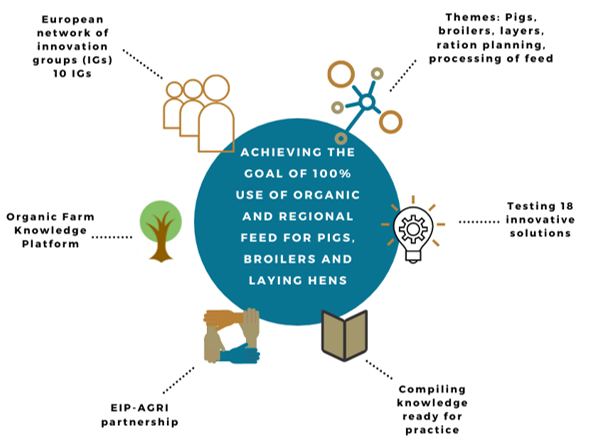All items and articles remain available on the OK-Net EcoFeed website.
Over the past three years, 21 organisations from 12 European countries have taken part in the Horizon 2020 OK-Net EcoFeed project to help farmers achieve 100% use of organic and regional feed for pigs and poultry. The project has now ended. For this reason, since March 2021 updates and activities on the project will be limited. However, all items and articles will remain available on this website. Check our reports, photos and videos on the “Resource tab”.

Our goal: 100% organic and regional feed for pigs & poultry
Use of regional feed is one of the requirements of the European organic regulation. For pigs and poultry, the revised European legislation requires that “by 2022 at least 30% of the feed shall come from the farm itself or, if this is not feasible or such feed is not available, shall be produced in cooperation with other organic or in-conversion production units and feed operators using feed and feed material from the same region” (Regulation EU, 2018/848).
Achieving 100% organic diets for monogastrics is challenging. The revised EU regulation acknowledges this difficulty by allowing the use of 5% non-organic protein feed for young animals. Furthermore, importing animal feed has economical disadvantages for farmers and can compromise the sustainability and decrease consumers’ confidence.
Our belief: Helping farmers and on-farm feed autonomy
The OK-Net Ecofeed project supported on-farm feed autonomy and helped producers achieve 100% organic rations for monogastric animals. All the project’s work aimed at tackling the organic feed objectives for the coming years, including reducing the cost of feed production, improving sustainability and animal welfare, and satisfying consumer expectation for traceability of production. To name few, the Soil Association in the UK proposes the use of sprouted seeds as a valuable green fodder to ensure good animal welfare, particularly when access to pasture for laying hens and broilers is restricted. In Italy, AIAB evaluated the possibility of growing camelina, which fits well into the crop rotation and it may so sustain the farm’s self-production. Camelina cake is also a protein-rich feed, and an efficient alternative to the protein of soya. In Spain, Ecovalia tested brewer’s yeast, an industry by-product rich in protein and vitamin B to be used as an alternative source of protein for pigs.
Our results: Knowledge exchange & Innovative solution for farmers
OK-Net EcoFeed’s experts and farmers run trials designed according to the regional potential and opportunities for farmers. More than 100 existing and new tools including reports, technical articles, leaflets, videos, booklets, scientific articles, results of trials and practice abstracts were collected.
Besides the variety of solutions and practices identified, OK-Net EcoFeed has created a free ration-planning software, allowing farmers and advisors to compose rations for organic pig and poultry that fit best to their conditions.
All tools are available for direct, free download from the Organic Farm Knowledge platform. During the OK-Net EcoFeed project, a significant effort was made to expand the Organic Farm Knowlegde platform to include all major themes related to organic farming, from horticulture, environmental protection to marketing and agricultural trade. Users can now browse through the platform’s themes or search the toolbox directly according to tool type, language, keywords and more.
All project outcomes were compiled and analysed to identify research needs and barriers to innovation and propose recommendations for a better-targeted research and innovation agenda. The full report is available on the project website.
More information
Bram Moeskops, Research & Innovation Manager, IFOAM Organics Europe
Ambra De Simone, Research & Innovation Project Coordinator, IFOAM Organics Europe
or visit www.organicseurope.bio
 OK-Net EcoFeed
OK-Net EcoFeed OK-Net EcoFeed
OK-Net EcoFeed